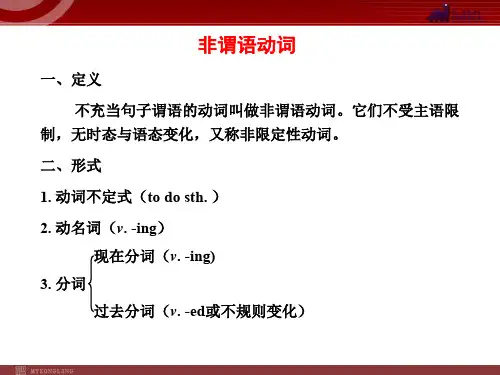She can’t help to clean the house because she’s busy making a cake. Excuse me. I couldn’t help overhearing what he said.
We had supper and went on to watch TV. He didn’t have a rest and went on working.
三、某些动词后接不定式和动名词的区别
He stopped to smoke a cigarette. I must stop smoking.
Don't forget to turn off the lights when you leave the classroom. He forgot turning the light off.
中考英语语法专题讲解 非谓语动词
构成
不定式的基本形式:to+动词原形,有时可以省 略to。这里的to是不定式符号,本身没有意义。 动词不定式的否定形式是“not+to do”。
句法功能
①作主语 动词不定式作主语时,常用it作形式主语,而将真正的 主语放在句末,其结构为:It+be+adj./n. (for/of sb.)+动词不定式。 To learn English well is useful. =It is useful to learn English well. It is a hard job for us to finish the work in such a short time. It is kind of you to help me a lot.
②作宾语 一些谓语动词后只能用不定式作宾语,常见的这类词表 示命令、打算或希望,如:would like, want, wish, hope, decide, plan, expect等。 Would you like to see a film this evening? 注意:在find, think后跟不定式作宾语时,常用it作形 式宾语,而将真正的宾语放在后面。










